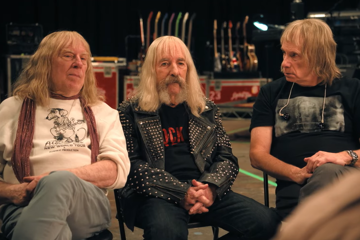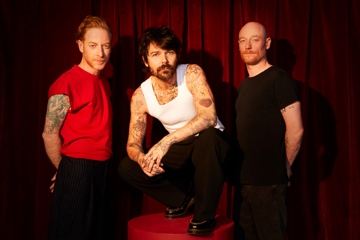The Pacifist's Guide To The War On Cancer (Complicité)
"An extraordinary window on the violence of this illness but also on the tenacity of the human spirit."

As an elevator pitch, it's an eyebrow-raising concept: a high-energy musical about cancer.
If mishandled, this gamble - attempting to force some compatibility between the brutal realities of that disease and the toe-tapping razzamatazz of Broadway - could come off as opportunistic, flippant, or even just plain offensive. And yet, when it premiered in 2016, Bryony Kimmings and British theatre company Complicité's The Pacifist's Guide To The War On Cancer somehow found the alchemy to make this pairing work.
In its original form, it was immediately recognisable as a work of pure musical theatre. Its 18-strong cast, accompanied by a live band, belted out tunes while twinkling their toes across a slick and sophisticated stage; this was a show that matched its thematic heft with an equally ample budget.
Don't miss a beat with our FREE daily newsletter
Its perspective was just as broad, exploring the experiences of cancer patients of all ages, backgrounds and genders. But for those familiar with Kimmings' powerful, raw canon of performance art, this polished spectacle may have seemed an odd departure. The stripped-back, reconceptualised touring iteration, currently in Melbourne, seems to be more faithfully aligned with Kimmings' stylistic vision.
With the running time cut to a brisk 100 minutes, the cast pruned to just six performers, helmed by Kimmings herself, and the set devolved into a more basic, no-frills space of scaffolding towers and simple curtaining, this recalibrated show is not only a study of cancer and the problematic ways we talk about it, but also a meta-examination of the emotional and psychological complexities dredged-up during the piece's creation.
Kimmings - only present in the original show as a disembodied voice - is now one of the stage's main focal points. Her presence chips away at the theatrical conceit, so that when Lara Veitch - a "real person" in her mid-twenties with a rare genetic disorder that has caused her body to develop major cancers eight times - enters the show as it's other main protagonist, the stark counterpoint between reality and theatre is both confronting and unexpected.
Veitch offers an extraordinary window on the violence of this illness but also on the tenacity of the human spirit and our ability to retain agency in the face of intense suffering. There are other observations that emerge from Veitch's experiences: the ham-fisted affectation of cancer's militarised vocabulary; the mistakes made by those around cancer suffers, such as pulling the "cancer face"; the strangely innate misogyny of cancer treatment, that sometimes seems as concerned with helping women remain "sexy" as it does with keeping them alive. But at the emotional core of the show is the relationship between Kimmings and Veitch, a friendship galvanised by tragedy and cemented in resilience.
Calling this show a musical might be drawing something of a long bow. There's certainly comic relief and frissons of dramatic whimsy to be found in the catchy songs and their witty lyrics. But it's truth, not artifice, that powers this production. At the end of the performance, as the cast tear down whatever thin tissue of a fourth wall may be left, they share their grief with the audience, who in turn reflect it back. It's a moment of solidarity, of communion, and of profound sincerity that theatre rarely captures.
The Pacifist's Guide To The War On Cancer plays until 18 Mar at Malthouse Theatre







